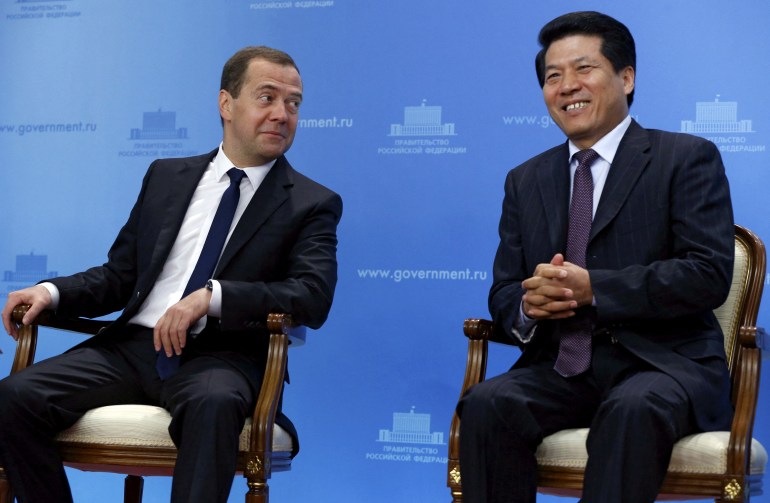Ukraine’s foreign minister told a top Chinese envoy that Kyiv would not accept any proposals to end the war with Russia that involved Ukraine losing territory or the placing of the conflict on hold, the Ukrainian foreign ministry said.
Foreign Minister Dmytro Kuleba made the remarks during a meeting in Kyiv with Li Hui, who is China’s special representative for Eurasian affairs and former ambassador to Russia.
Kuleba discussed with Li “ways to stop Russian aggression”, the Ukrainian Foreign Ministry said in a statement on Wednesday.
In his meeting, Kuleba “emphasised that Ukraine does not accept any proposals that would involve the loss of its territories or the freezing of the conflict”.
Restoring a “just peace” in Ukraine depended on “respect for the sovereignty and territorial integrity of Ukraine”, Kuleba said, according to the statement.
There was no word on how Li responded to Kuleba.
Li was in Kyiv on Tuesday and Wednesday seeking to promote Beijing-led negotiations to resolve the conflict.

Li is the highest-ranking Chinese diplomat to visit Ukraine since Moscow invaded in February 2022 and his arrival in Kyiv comes three weeks after Ukrainian President Volodymyr Zelenskyy spoke by telephone with Chinese leader Xi Jinping.
Zelenskyy also appointed a new Ukrainian ambassador to China on the same day, the Kyiv Independent media organisation reported.
Officials in Kyiv had warned ahead of the Chinese visit that Ukraine did not need “mediation for the sake of mediation”.
“Ending the war with a compromise at the expense of Ukraine will not work,” a senior Ukrainian official, speaking on condition of anonymity, told the French news agency Agence France-Presse.
Beijing said the aim of the visit was to “communicate with all parties on the political settlement of the Ukrainian crisis”.
Li is now expected to visit Moscow, according to the Chinese government, and also Poland, Germany and France to discuss a possible political solution to the conflict.
Xi, who visited Moscow in March and has aimed to position China as a neutral mediator, has been criticised for refusing to condemn the Kremlin’s attack on its neighbour and the now 15-month-long war. China has also supported Moscow politically.
Officials in Beijing recently ordered foreign embassies to remove so-called “propaganda” on display at diplomatic missions in what is being interpreted as an apparent reference to shows of support for Ukraine.
A spokesperson for the European Union said the Protocol Department of the Chinese Foreign Ministry circulated a note on May 8 to all diplomatic missions to the effect that they should “respect Chinese laws and regulations” and “not to use the external walls of embassies to carry out politicised propaganda to avoid causing disputes between countries”.
The note does not specify what might constitute “politicised propaganda”, nor communicates further on the matter, said the EU spokesperson.
According to diplomats in Beijing, Ukrainian flags and placards set up by the embassies of Canada, France, Germany and other governments are the only public displays by most foreign missions other than tourism advertisements.
Countries supporting Ukraine see little current prospect for a negotiated peace, particularly owing to Russia’s insistence on achieving its war aims and the Kremlin’s demand that Kyiv acknowledge Russia’s annexation of the Crimean Peninsula and the Ukrainian provinces of Donetsk, Kherson, Luhansk and Zaporizhia, which most nations have denounced as illegal.
Ukraine has rejected those demands and ruled out any talks with Russia until its troops pull back from all occupied territories.
Zelenskyy’s own 10-point peace plan also includes an international tribunal to prosecute crimes of aggression, which would enable Russia to be held accountable for its invasion.
Zelenskyy told reporters during his recent visit to Italy that there was little point in efforts by certain countries to attempt to “mediate between Ukraine and Russia to end the war”, what was needed was a “just peace” based on Ukraine’s formula for peace.
“Russia started the war. Russia took lives. The war is on our land. We know all the crises that have happened, the challenges: nuclear, environmental, food, energy. Only we know what it is like,” Zelenskyy said in respone to questions regarding China or the Vatican’s possible role in a peace efforts.
“We have not proposed an artificial plan – we have proposed how to get out of this situation, to end the war – according to the law, respecting the UN Charter, international law, people, values,” he said, according to a transcript on President of Ukraine’s website.
Several African countries as well as Brazil and the Vatican have spoken out in favour of peace talks.
South African President Cyril Ramaphosa said on Tuesday that Putin and Zelenskyy had agreed to host “an African leaders peace mission” in Moscow and Kyiv, respectively.
Ramaphosa did not give a time frame or outline any parameters for the possible peace talks which would involve a delegation of leaders from six African countries to discuss a possible peace plan.


